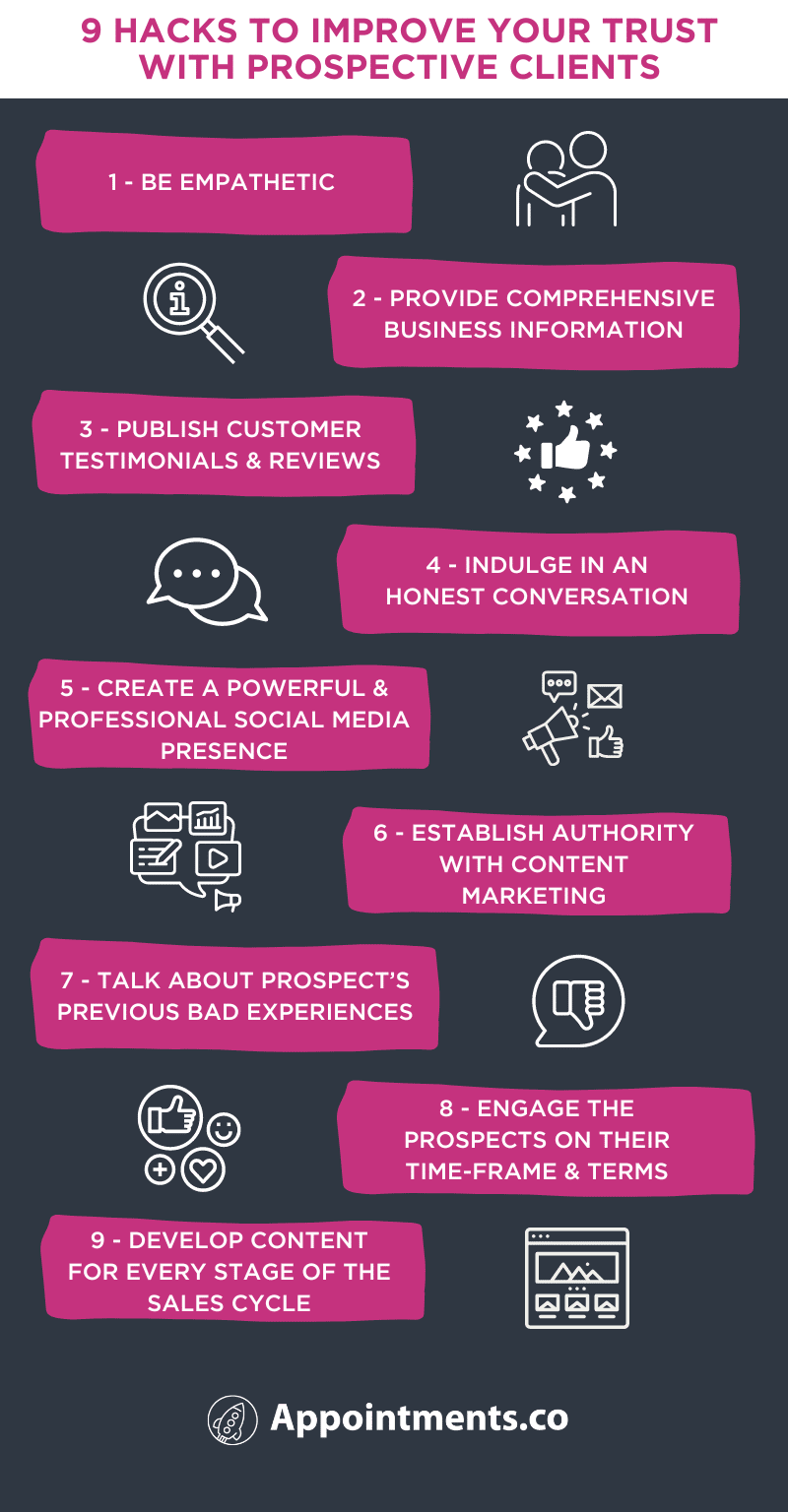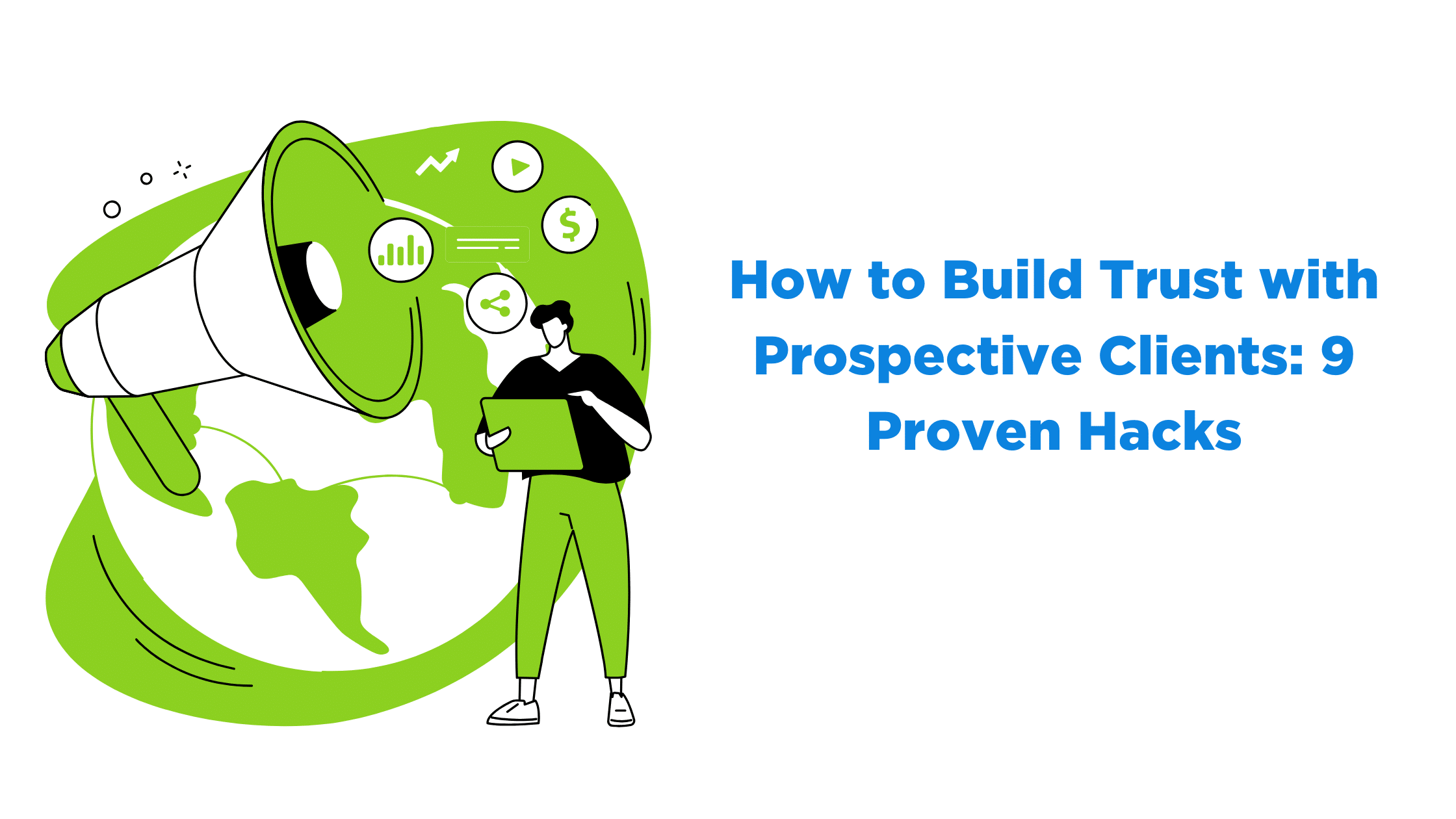Just like any relationship, personal or professional, trust doesn’t come overnight. It takes time. In today’s flooded market, while closing a deal, trust is certainly one of the most important aspects on the mind of a prospective client.
In the B2B sector, businesses need to know they are in good hands. That is why B2B transactions require more time as multiple decision-makers are involved, hence, developing trust is essential to closing the deals.
Whatever it is product or service you are trying to sell, the whole process needs to be built on a foundation of trust. Not for just a single sale, but for a long-term relationship with your clients. But, how do you build trust with prospective clients?
In this blog guide, we will discuss the top nine ways to build a solid foundation of trust with your prospective clients, so you can close more deals. Let’s get right into it!
Table of Contents
- 9 Hacks to Improve Your Trust with Prospective Clients
- Frequently Asked Questions
- Final Thoughts
- Related Posts
9 Hacks to Improve Your Trust with Prospective Clients

1 – Be Empathetic
Businesses come to your brand to solve specific problems. You need to make them feel that you understand their situation. You need to ask engaging questions and listen carefully to what they say. You should be mildly prepared for the conversation, and for that, you should do some research first.
In today’s digital age, salespersons and sales development executives can access a wealth of information at their fingertips. So, before interacting with prospective clients, look at their business, industry, and social profiles to prepare your pitch accordingly.
2 – Provide Comprehensive Business Information
The very basic scan the prospective clients does before making a decision is looking for essential company information on Google, and your website. Your website should have information about the brand, as well as your products or services.
Make sure that the company’s About page is full of insights, and provides a comprehensive overview of the organization. Next, use images, and bios for the leadership and management, and add their social profile links (Twitter, LinkedIn, etc.). Also, add contact options, and user-friendly, interactive contact forms on the website. Make sure to disclose your business address with Google My Business listings.
3 – Publish Customer Testimonials & Reviews
Almost 97% of B2B buyers feel that user-generated content, such as testimonials and customer reviews, is more credible than other content types. And, why not? Every business wants a company with tons of positive reviews over someone with near-zero reviews or ratings.
When other businesses talk about your brand or quote you, it demonstrates the trust prospective clients have placed in your brand and puts you in a positive light. To demonstrate this trust and value, you should have a dedicated Testimonials section, and case study page on your website, along with links to popular and credible review sites.
4 – Indulge in an Honest Conversation
Never put yourself and the deal first because that won’t be fruitful. Understand the value of an honest, open conversation, which will help you establish trust, and credibility with your prospects and existing clients. So, it is crucial to respond to the prospect’s queries honestly.
The more honest and genuine the conversation gets, the more comfortable your prospects will likely feel. If you are with a prospective client in an in-person meeting, ensure consistent eye contact, and use friendly gestures. While on call, ensure that your talking speed and volume match the client’s.
5 – Create a Powerful & Professional Social Media Presence
Social media is one of the most important indicators of a brand’s professionalism and reputation. Businesses in the B2B industry are often active on social platforms, like LinkedIn, Facebook, and Twitter. Therefore, it is crucial to leverage the power of social media outreach to establish trust with potential clients.
So, analyze your industry, and see where your ideal audience is. Then, ensure you have updated the profile with high-quality images and complete information. Make sure that you regularly post informative and user-generated content, such as story mentions, and blog mentions to create a sense of credibility for your prospective clients.
6 – Establish Authority with Content Marketing
Content marketing is really important for building authority in your industry. In this digital marketing era, content is king, and search engines can help you gain that trust with your prospective clients if you regularly develop and publish quality content.
When you write quality content that is relatable for the readers, and is easy to digest, search engines, like Google and Bing recognize the value of your content and brand. The better you use SEO practices and write effectively, the higher you can rank, establishing your authority in the niche.
7 – Talk About Prospect’s Previous Bad Experiences
Sometimes prospects have dealt with businesses that didn’t deliver well on their promises, and that bad experience impacts the ability to trust you. So, you should proactively bring this up to acknowledge their previous experiences and issues.
You can then show them how you’re different, and how your products and services can deliver a delightful experience. This shows your trustworthiness, and prospective clients may feel more comfortable discussing their business challenges. SDRs can follow a good approach and write their script to develop trust.
8 – Engage the Prospects on Their Time-frame & Terms
You need to respect the prospective client’s time to maintain professionalism without sounding like a “salesperson.” Business people are busy, and if you try to pursue them between their busy schedules, they might feel like you are simply trying to sell the product.
Also, if you have scheduled a meeting with them, show up on time, and keep your schedule flexible if they are a bit late. Moreover, stay connected with them over messages and emails to follow up, and schedule further meetings or calls. These little things are critical to building trust, and developing a healthy business relationship.
9 – Develop Content for Every Stage of the Sales Cycle
The B2B sales cycle consists of different steps, and you must develop trust along the way. You should be ready with informative content for prospective clients at different sales funnel stages.
At each stage, you should be ready with different types of content like infographics, blog guides, whitepapers, videos, and webinars to answer their potential questions and guide them further down the funnel. The more your content helps prospective clients to understand your products and services, the more it can come out as the perfect solution to their challenges, and the more likely you are to close the deal.
Frequently Asked Questions
1. What is a prospect?
A lead that has been qualified is a prospect. Prospects are placed further down the sales funnel, regardless of whether they have shown interest in your products/services.
2. How do you build trust with prospects?
– Empathize with them
– Showcase your testimonials
– Listen to their problems
– Have honest conversations
– Establish authority over your content
3. How do you get more prospects?
Different ways to get more prospects are based on your audience and product or service. Some of them are listed below.
– Utilize content marketing
– Create a powerful social media presence
– Create customer testimonials and reviews
– Offer valuable information that will benefit the prospects
Final Thoughts
By practicing and implementing these given methods, you can efficiently prove your expertise and develop trust with prospective clients. Once you start building trust, you can easily close more deals. However, it is always easier said than done, right?
It can be tough to establish authority and build trust with limited resources if you are a small to medium business, just starting in the digital marketplace. Many businesses outsource sales funnel processes, like lead nurturing and appointment setting. If you want to outsource some of your crucial sales processes, feel free to contact our experts.
Related Posts:
Illustrations by Storyset



